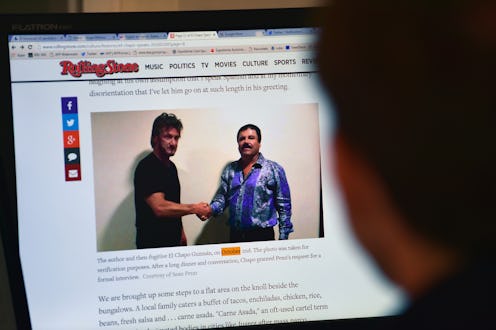News
The One Problem With Sean Penn's El Chapo Defense
Sitting down with Charlie Rose in an interview that aired Sunday on 60 Minutes, Sean Penn tried to defend his interview with Joaquín "El Chapo" Guzmán, the one-on-one with the big-league drug trafficker and two time prison escapee that was published in Rolling Stone this month. Trying to explain his actions to Rose, Penn kept talking about El Chapo as a human that we shouldn't demonize. But El Chapo's actually done some pretty bad things — and I'm not talking selling narcotics.
El Chapo was in prison for murder when he broke out — not just trafficking. And his henchmen have killed thousands — and perhaps more. The push for his group, the Sinaloa Cartel, to take over drug routes in Ciudad Juarez — the Mexican city across the border from El Paso, Texas — created "the drug war's biggest bloodbath," The Washington Post reported upon his second capture and arrest in Mexico in 2014 (his capture this month is his third).
Tom Fuentes, a law enforcement analyst and a former assistant director of the FBI, told CNN, "It's estimated that he may have murdered or ordered the murders of more than 10,000 people." That's extreme and not something that should be ignored. At its worst, the drug violence El Chapo is at least partly responsible for made parts of Mexico more deadly than Iraq or Afghanistan.
And these facts Penn seems completely willing to downplay, both in his interview with El Chapo and when justifying it to Charlie Rose, focusing on how El Chapo is "another human being, which everyone is." El Chapo is a human being, of course, but he's also a murderer and drug trafficker — and that part of his identity that would be most interesting to explore, something Penn isn't able to do.
In his article, he acknowledges the many activists, journalists, and soldiers who have lost their life in the drug war. But then in his intro to the Rolling Stone piece he goes on to write:
I took some comfort in a unique aspect of El Chapo's reputation among the heads of drug cartels in Mexico: that, unlike many of his counterparts who engage in gratuitous kidnapping and murder, El Chapo is a businessman first, and only resorts to violence when he deems it advantageous to himself or his business interests.
I think Penn's downplaying the violence done in El Chapo's name comes from a good place. As he wrote for Rolling Stone and told Charlie Rose, his goal was to highlight America's complicit role in the violence created not just in Mexico, but on the streets of American cities where similar turf wars play out, and in our criminal justice system that punishes addicts for their illness.
But by turning El Chapo into an everyman who you can sit down to coffee with — and then not more forcefully addressing the violence that is a part of his business model, or even better why it's a part of his business model, he made the story about the narco king and not how the United States should amend its drug policy. That's exactly what has happened.
Penn, to be fair, was never able to sit down and prod El Chapo on the tougher subjects, ask follow-up questions or push the drug trafficker to elaborate on the economics and policies that lead to this kind of business and the violence that goes along with it. And that's the real shame of the situation.
Had Penn been able to explore and question El Chapo as not just another human being —but also a leader of a violent criminal drug syndicate — he may have been able to have a really interesting interview. He could have gotten to the crux of where the violence comes from out of the mouth of the man in charge. With that kind of interview, he may have been able to change the conversation on drug policy.
And he knows it. As he told Rose:
Let me be clear. My article has failed ... in that everything that's spoken about is everything but what I was trying to speak about.
Penn's attempt at changing the conversation on America's drug problem may have failed with this article, but he can always make a movie about it. And that's not sarcasm. He really should.
